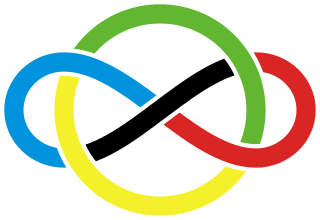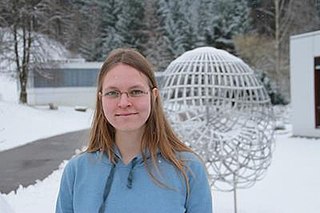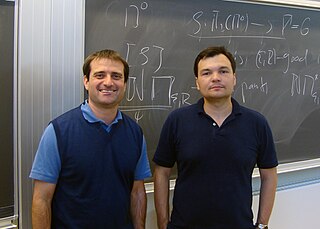
The International Mathematical Olympiad (IMO) is a mathematical olympiad for pre-university students, and is the oldest of the International Science Olympiads. It is “the most prestigious” mathematical competition in the world. The first IMO was held in Romania in 1959. It has since been held annually, except in 1980. More than 100 countries participate. Each country sends a team of up to six students, plus one team leader, one deputy leader, and observers.

Sir William Timothy Gowers, is a British mathematician. He is Professeur titulaire of the Combinatorics chair at the Collège de France, and director of research at the University of Cambridge and Fellow of Trinity College, Cambridge. In 1998, he received the Fields Medal for research connecting the fields of functional analysis and combinatorics.
The United States of America Mathematical Olympiad (USAMO) is a highly selective high school mathematics competition held annually in the United States. Since its debut in 1972, it has served as the final round of the American Mathematics Competitions. In 2010, it split into the USAMO and the United States of America Junior Mathematical Olympiad (USAJMO).
A cognitive tutor is a particular kind of intelligent tutoring system that utilizes a cognitive model to provide feedback to students as they are working through problems. This feedback will immediately inform students of the correctness, or incorrectness, of their actions in the tutor interface; however, cognitive tutors also have the ability to provide context-sensitive hints and instruction to guide students towards reasonable next steps.

Terence Chi-Shen Tao is an Australian mathematician. He is a professor of mathematics at the University of California, Los Angeles (UCLA), where he holds the James and Carol Collins chair. His research includes topics in harmonic analysis, partial differential equations, algebraic combinatorics, arithmetic combinatorics, geometric combinatorics, probability theory, compressed sensing and analytic number theory.
The Mathematical Olympiad Program is an intensive summer program held at Carnegie Mellon University. The main purpose of MOP, held since 1974, is to select and train the six members of the U.S. team for the International Mathematical Olympiad (IMO).
Reid William Barton is a mathematician and also one of the most successful performers in the International Science Olympiads.
The Indian National Mathematical Olympiad (INMO) is a highly selective high school mathematics competition held annually in India. Since its debut in 1989, it has served as the final round of the Indian Olympiad Qualifier in Mathematics. It is the third tier in the Indian team selection procedure for the International Mathematical Olympiad and is conducted by the Homi Bhabha Centre for Science Education (HBCSE) under the aegis of the National Board for Higher Mathematics (NBHM).
The Worldwide Online Olympiad Training (WOOT) program was established in 2005 by Art of Problem Solving, with sponsorship from Google and quantitative hedge fund giant D. E. Shaw & Co., in order to meet the needs of the world's top high school math students. Sponsorship allowed free enrollment for students of the Mathematical Olympiad Program (MOP). D.E. Shaw continued to sponsor enrollment of those students for the 2006-2007 year of WOOT.
Titu Andreescu is an associate professor of mathematics at the University of Texas at Dallas. He is firmly involved in mathematics contests and olympiads, having been the Director of American Mathematics Competitions, Director of the Mathematical Olympiad Program, Head Coach of the United States International Mathematical Olympiad Team, and Chairman of the United States of America Mathematical Olympiad. He has also authored a large number of books on the topic of problem solving and olympiad-style mathematics.

Akshay Venkatesh is an Australian mathematician and a professor at the School of Mathematics at the Institute for Advanced Study. His research interests are in the fields of counting, equidistribution problems in automorphic forms and number theory, in particular representation theory, locally symmetric spaces, ergodic theory, and algebraic topology.
This article describes the selection process, by country, for entrance into the International Mathematical Olympiad.
The National Mathematics Talent Contest or NMTC is a national-level mathematics contest conducted by the Association of Mathematics Teachers of India (AMTI). It is strongest in Tamil Nadu, which is the operating base of the AMTI. The AMTI is a pioneer organisation in promoting, and conducting, Maths Talent Tests in India. In the National level tests 66,066 students, from 332 institutions spread all over India, participated at the screening level. Of these, 10% were selected for the final test. For the benefit of final level contestants, and the chosen few for INMO, special orientation camps were conducted. Merit certificates and prizes were awarded to the deserving students.
In number theory, Vieta jumping, also known as root flipping, is a proof technique. It is most often used for problems in which a relation between two integers is given, along with a statement to prove about its solutions. In particular, it can be used to produce new solutions of a quadratic Diophantine equation from known ones. There exist multiple variations of Vieta jumping, all of which involve the common theme of infinite descent by finding new solutions to an equation using Vieta's formulas.

Andrei Vladlenovich Zelevinsky was a Russian-American mathematician who made important contributions to algebra, combinatorics, and representation theory, among other areas.

Lisa Sauermann is a mathematician from Germany known for her performance in the International Mathematical Olympiad, where in 2011 she had the single highest score. She won four gold medals (2008–2011) and one silver medal (2007) at the olympiad, representing Germany.

Jeremy Adam Kahn is an American mathematician. He works on hyperbolic geometry, Riemann surfaces and complex dynamics.

Zvezdelina Entcheva Stankova is an American mathematician who is a professor of mathematics at Mills College and a teaching professor at the University of California, Berkeley, the founder of the Berkeley Math Circle, and an expert in the combinatorial enumeration of permutations with forbidden patterns.

Tanya Khovanova is a Soviet-American mathematician who became the second female gold medalist at the International Mathematical Olympiads. She is a lecturer in mathematics at the Massachusetts Institute of Technology.

Zhuo Qun Song, also called Alex Song, is a Chinese-Canadian who is currently the most highly decorated International Mathematical Olympiad (IMO) contestant, with five gold medals and one bronze medal.










